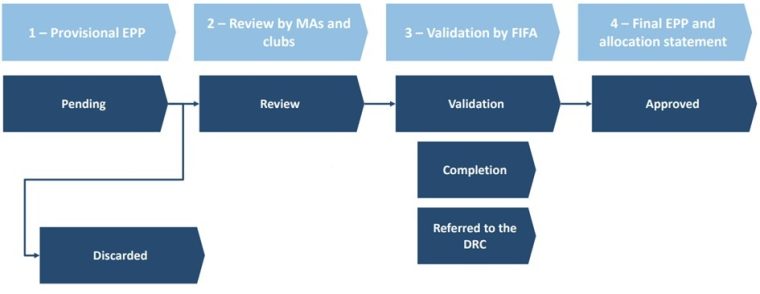In recent years, FIFA has imposed increasingly strict oversight on the hundreds of millions of euros generated annually by the football industry and how these funds are spent. In this context, FIFA has established mechanisms such as the FIFA Transfer Matching System (hereinafter: “FIFA TMS”) to digitalise the transfer system, and the FIFA Clearing House (hereinafter: “FCH”), which acts as an intermediary to centralise and distribute payments among the clubs involved.
Although these mechanisms were introduced to digitalise and facilitate football-related transactions, clubs frequently encounter significant difficulties and frustrations when using FIFA TMS, particularly in collecting and uploading the required documentation. Moreover, failure to comply with promised payment deadlines often results in disputes between clubs and FIFA. Consequently, a growing number of professional clubs feel compelled to engage so-called “TMS Managers” to handle and monitor the complex TMS and FCH procedures.
In what follows, we provide a brief overview of the evolution and objectives of both the FIFA TMS and the FCH. We also explain the functioning of both systems and offer insights into the day-to-day challenges clubs continue to face when interacting with FIFA TMS and the FCH.
Origins and Objectives
In October 2010, FIFA initiated the digitalisation of the transfer system by launching the FIFA TMS—an electronic system designed to monitor international transfers and make them “faster, smoother, and more transparent”.
Since 2015, claims related to training compensation and solidarity contributions have also been processed via the TMS platform, making them easier to track and submit.
- Training compensation and solidarity contributions (hereinafter: “training rewards”) were introduced to financially reward football clubs that contribute to the training and development of players from a young age. The provisions governing these mechanisms are extensively set out in Articles 20 and 21 and Annexes IV and V of the FIFA Regulations on the Status and Transfer of Players.
- These training rewards are triggered by player transfers, making it essential for FIFA to have visibility through the TMS on the amounts involved and the timing of such payments.
In November 2022, the transfer system was further revolutionised with the establishment of the FIFA Clearing House, an independent financial institution with the following key objectives:
- The centralisation of payments, serving as a payment gateway for transfer-related and
training-related payments; and - The distribution of these payments based on the creditor clubs’ provided club information.
Prior to the establishment of the FCH, creditor clubs frequently experienced situations in which, upon becoming aware of a transfer that triggered their entitlement to training rewards, their payment requests were routinely rejected or simply ignored by the debtor club. As a result, such clubs were often forced to initiate legal proceedings and claim their dues through the FIFA Dispute Resolution Chamber—an expensive procedure that many clubs could not afford, ultimately causing them to forgo compensation to which they were rightfully entitled.
The FCH aims to eliminate this issue by proactively requesting payment from the debtor club and distributing the funds to the training clubs accordingly.
Functioning of the FCH and Use of FIFA TMS
Electronic Player Passport (EPP)
Whenever a player signs a professional contract for the first time or whenever an international (or nationally-international) transfer occurs, training rewards are triggered and the FCH opens a case within FIFA TMS.
Once a case is initiated, the Electronic Player Passport (hereinafter: “EPP”) is compiled. The EPP is an electronic document providing an overview of all clubs with which the player has been registered since the age of 12.
The FCH begins by publishing a provisional EPP, based on data received digitally from the various national associations. All clubs involved automatically receive a notification and are, in principle, granted 10 days during the review phase to examine the EPP, upload documents, request amendments to registration data, upload waivers, raise objections, etc. Unlisted clubs may also submit a request to be included in the EPP composition process.
During the completion phase, the FIFA Secretariat validates the EPP and reviews the amendment or objection requests submitted by the relevant clubs. Complex cases are referred to the FIFA Dispute Resolution Chamber (DRC), which renders a decision and determines the final EPP. While a case is
pending before the FIFA DRC, the EPP compilation process is suspended. This phase generally takes approximately 15 days.
Once the review and completion phases are finalised, the final EPP is confirmed, which serves as the basis for the Allocation Statement, outlining the amounts due and their distribution among eligible clubs.

Allocation Statement
Based on the final EPP, the Allocation Statement is prepared. This document contains all relevant information required to execute the payments, including 1) whether any club owes a training reward in relation to the transfer, 2) which clubs are entitled to receive training rewards, and 3) the respective amounts due.
The FIFA Secretariat notifies all involved clubs of the final EPP and the Allocation Statement. This constitutes a binding decision, against which only an appeal to the Court of Arbitration for Sport (CAS) is possible.
Compliance Assessment
Once the Allocation Statement is issued, all involved clubs are required by the FCH to accept the
FCH’s general terms and upload the following documentation:
- Extract from the national trade register (in Belgium: Kruispuntbank van Ondernemingen);
- Articles of Association;
- Bank statement showing the club’s bank account number;
- Extract from the UBO register;
- Copy of the club representative’s ID card.
While the compliance phase is officially intended to take 45 days, in practice, this period often extends significantly—sometimes exceeding 150 days.
Payment and Distribution
Once all involved clubs have passed the compliance assessment, the FCH issues a payment request to the debtor club based on the EPP and the Allocation Statement for the total amount due. The debtor club then has 30 days to transfer the amount to the FCH. Once payment is received, the FCH is expected to distribute the training rewards within two days to the eligible clubs in accordance with the Allocation Statement.
Criticism and Challenges
Two and a half years after the FCH’s introduction, the project has been subject to significant criticism from clubs. FIFA has already received hundreds of complaints from individual clubs, the European Club Association (ECA), and the Union of European Clubs (UEC).
The increasing bureaucratisation has made the system overly complex, particularly for smaller clubs, and disruptive to the operations of professional clubs. The system repeatedly requires submission of the same information, often causing breakdowns in communication. As a result, incorrect EPPs and Allocation Statements are sometimes issued, which can financially harm (especially smaller) clubs due to the large sums involved. The only avenue for appeal is to CAS, which entails a prohibitive cost for many of these clubs and offers no guarantee of success.
Moreover, the system penalises both non-compliant clubs and those who diligently comply. The FCH only sends payment requests and proceeds with distribution once all involved clubs have completed the compliance process and submitted the required documents. It is unfair for compliant clubs to suffer delays due to one club’s failure to comply. This interdependence between clubs is unsustainable and unjust. As a result, many clubs receive their training rewards only after an excessively long period (often over 18 months) or not at all—and in the meantime, they receive no updates from FIFA.
Finally, clubs are also heavily reliant on their national associations. For example, clubs may miss out on training rewards due to errors by their associations in digitally confirming player registration histories.
The lawyers at PowerPlay have extensive experience as in-house counsel for various clubs and specialise in guiding clubs through the complex FIFA TMS and FCH procedures. Do you have questions about using FIFA TMS or are you involved in disputes relating to training
compensation, solidarity contributions, or the FIFA Clearing House? Our team is ready to provide you
with expert and effective legal support and guidance.
